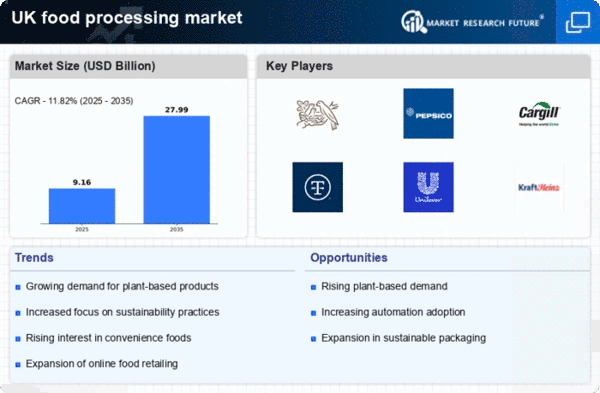Growing Interest in Local Sourcing
The food processing market in the UK is experiencing a growing interest in local sourcing, as consumers increasingly prioritize products that are produced closer to home. This trend is driven by a desire for fresher ingredients, support for local economies, and reduced carbon footprints associated with transportation. Recent surveys indicate that approximately 60% of consumers are willing to pay a premium for locally sourced products. Consequently, food processors are adapting their supply chains to incorporate more local ingredients, which may enhance product appeal and foster community relationships. The food processing market is thus likely to see a shift in sourcing strategies, with an emphasis on transparency and sustainability. This focus on local sourcing could also influence marketing narratives, as companies highlight their commitment to supporting local farmers and producers.
Rising Demand for Convenience Foods
The food processing market in the UK is experiencing a notable shift towards convenience foods, driven by changing consumer lifestyles. As more individuals seek quick meal solutions, the demand for ready-to-eat and easy-to-prepare products is increasing. Recent data indicates that the convenience food segment has grown by approximately 15% over the past year, reflecting a broader trend in consumer preferences. This shift is particularly evident among busy professionals and families, who prioritize time-saving options without compromising on quality. Consequently, food processors are adapting their offerings to meet this demand, leading to innovations in packaging and product formulation. The food processing market is thus evolving to cater to these preferences, which may further influence production strategies and supply chain dynamics in the coming years.
Emergence of Plant-Based Alternatives
The food processing market in the UK is witnessing a significant rise in the popularity of plant-based alternatives, driven by a growing awareness of health and environmental issues. Consumers are increasingly seeking meat substitutes and dairy alternatives, leading to a surge in product innovation within the sector. Recent market analysis indicates that the plant-based food segment has expanded by over 25% in the last year, reflecting a shift in dietary preferences. This trend is not only reshaping consumer choices but also prompting food processors to rethink their ingredient sourcing and production methods. The food processing market is thus adapting to this demand by developing new formulations that cater to both taste and nutritional value. This evolution may have lasting implications for traditional food categories and could redefine market competition in the years ahead.
Increased Focus on Food Safety Standards
Food safety remains a paramount concern within the food processing market in the UK, particularly as consumers become more aware of health risks associated with foodborne illnesses. Regulatory bodies are continuously updating safety standards, compelling food processors to enhance their quality control measures. The implementation of stringent safety protocols is not only a legal requirement but also a competitive advantage in the market. Recent statistics suggest that compliance with food safety regulations can lead to a 20% increase in consumer trust and brand loyalty. As a result, the food processing market is investing in advanced technologies and training programs to ensure adherence to these standards. This focus on safety is likely to shape product development and marketing strategies, as companies strive to reassure consumers about the integrity of their food products.
Technological Integration in Production Processes
The integration of advanced technologies in production processes is transforming the food processing market in the UK. Automation, artificial intelligence, and data analytics are increasingly being adopted to enhance efficiency and reduce operational costs. Recent reports indicate that companies implementing these technologies have seen productivity improvements of up to 30%. This technological shift not only streamlines manufacturing but also allows for better quality control and traceability of products. As the food processing market embraces these innovations, it is likely to lead to more sustainable practices and reduced waste. Furthermore, the ability to analyze consumer data can inform product development, ensuring that offerings align with market demands. This trend towards technological integration may redefine competitive dynamics within the sector.
















